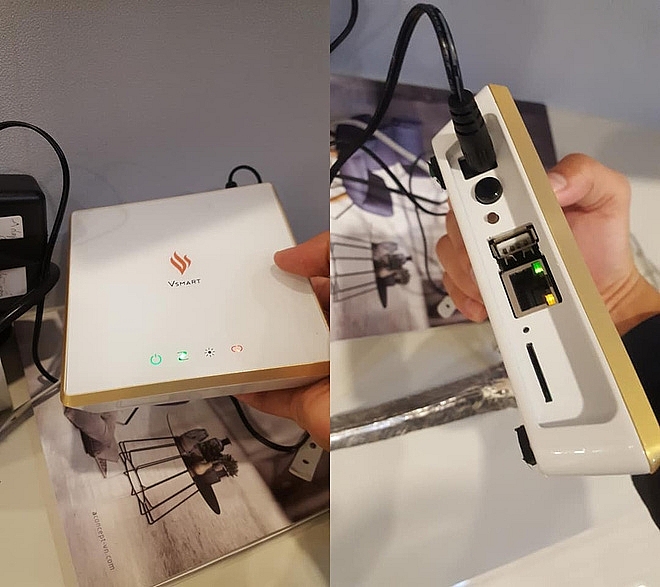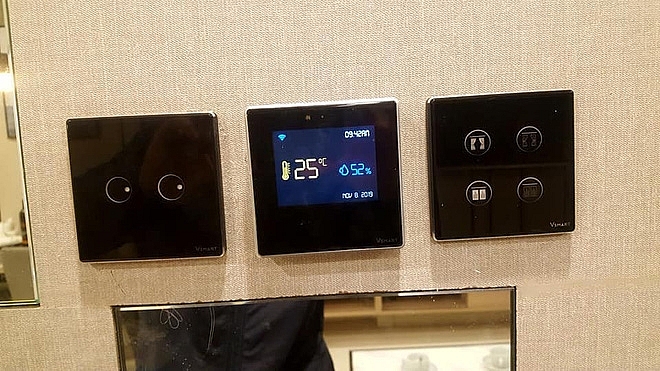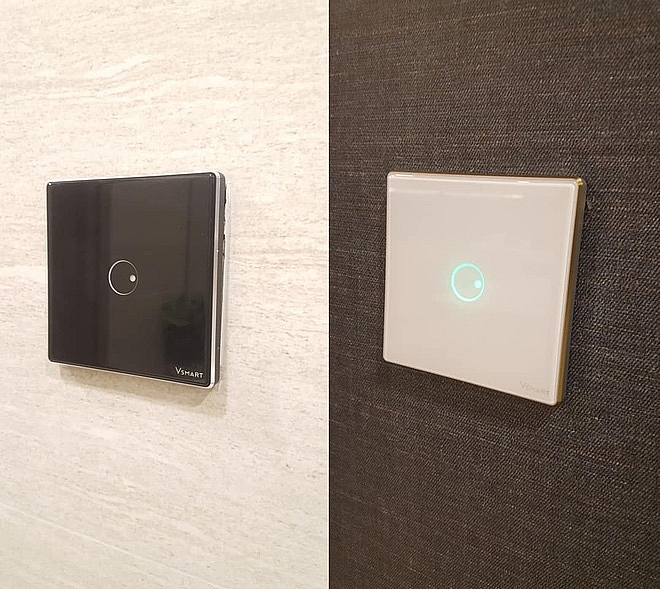Images of Vingroup smart home devices appear online
 |
| Vingroup smart home devices show its face, photo: gek.vn |
Images of Vsmart smart home devices have been shared on a facebook group recently. The images include a smart switch and hub connecting smart home devices, as well as a screen showing the temperature and humidity levels. The devices seem to be in a completed form, ready for the market.
 |
Up to now, the smart home market was dominated by VNPT, Viettel, MobiFone, and BKAV, among a select few. BKAV is considered the leading in the market. While Vimart is a latecomer, it has definitive advantages in its large real estate arm, which could be a potential premise for its smart home devices.
In addition, Vingroup's manufacturing capacity is touted as large-scale and modern. Recently, Vingroup has acquired many startups related to the Internet of Things (IoT), especially camera technology.
 |
“The Vsmart ecosystem has both hardware and software as well as added-services. Vsmart will build smart devices – smart apartments – and smart cities,” Nguyen Viet Quang, general director of Vingroup, said.
Assessing the smart home market, Nguyen Duc Long, CEO of Homa Vietnam, a company specialised in supplying smart home solutions, said that the company conducted a survey in the past two years, finding high demand for smart homes in Vietnam, but not every company in this field can meet that need.
According to Long, there are three main reasons holding back smart home devices from gaining popularity. There are no solutions providing stable connectivity between devices and the cloud. Also, installing smart home devices would require significant alterations to the walls and other features of the building, while current smart home functions do not warrant such enthusiasm just yet.
With rising concerns over the abundance of IoT devices from China and related information security risks, Vingroup's new smart home solutions – that may be launched by the end of this year – could be a welcome change.
Experts at the conference "Ensuring Information Security in Digital Transformation and E-Government" this early November shared that most cameras in the Vietnamese market are originally from China. Meanwhile, users usually do not change the default password on the camera, leading to a risk of data leaks.
At the conference, the Authority of Information Security under the Ministry of Information and Communications also shared that violations of personal information in Vietnam include buying and selling personal data such as names or phone numbers, disclosing information about celebrities and vulnerable people, collecting personal information, disclosing customer information in e-commerce transactions, as well as collecting personal information through attacks on personal computers and databases.
Specifically, the representative of the Authority of Information Security cited a visit to the shodanhq.com website and searching for cameras in Vietnam. The results showed that thousands of cameras were exposed online, from private homes to public places. "Unauthorised people can penetrate very deeply the privacy of the camera owner and could use this information to cause harm," the representative emphasised.
The representative of the Ministry of Defense also warned about information insecurity at the about 100,000 global IoT devices. In case these devices use the default username/password, they can easily be hijacked to form a botnet, which is a number of Internet-connected devices, each of which running one or more bots. Botnets can be used to perform distributed denial-of-service attack (DDoS attack), steal data, send spam, and allow the attacker to access the device and its connections. For example, malicious code Mirai in October 2016 infected smart devices including security cameras that run on ARC processors, turning them into a network of remotely controlled bots or zombies.
What the stars mean:
★ Poor ★ ★ Promising ★★★ Good ★★★★ Very good ★★★★★ Exceptional
Related Contents
Latest News
More News
- Masan Consumer names new deputy CEO to drive foods and beverages growth (February 23, 2026 | 20:52)
- Myriad risks ahead, but ones Vietnam can confront (February 20, 2026 | 15:02)
- Vietnam making the leap into AI and semiconductors (February 20, 2026 | 09:37)
- Funding must be activated for semiconductor success (February 20, 2026 | 09:20)
- Resilience as new benchmark for smarter infrastructure (February 19, 2026 | 20:35)
- A golden time to shine within ASEAN (February 19, 2026 | 20:22)
- Vietnam’s pivotal year for advancing sustainability (February 19, 2026 | 08:44)
- Strengthening the core role of industry and trade (February 19, 2026 | 08:35)
- Future orientations for healthcare improvements (February 19, 2026 | 08:29)
- Infrastructure orientations suitable for a new chapter (February 19, 2026 | 08:15)

 Tag:
Tag:
























 Mobile Version
Mobile Version